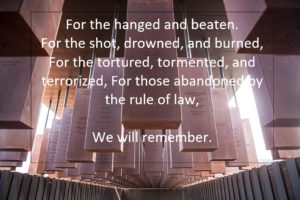Worship Resource for 60th Anniversary of the March on Washington
PSEC Racial Justice Initiative – YouTube
What is Christian Nationalism and Why Does it Matter?
There is a real and present threat to our democracy, to marginalized communities, and to our Christian identity as Christian Nationalism has gained a foothold in America. Here is a link to a letter by Bishop Dwayne Royster, Executive Director, POWER; Senior Pastor, Faith United Church of Christ, inviting clergy and lay leaders to denounce Christian Nationalism, educate our communities about its falsehoods, and work to offer faithful alternative for the future of our state.
In addition, here is the link to the panel presentation on Christian Nationalism sponsored by the Pennsylvania Council of Churches and featuring Robert Jones, author of White Too Long: The Legacy of White Supremacy in American Christianity. And a link to a program featuring Dr. Greg Carey and Dr. Traci West on “Confronting White Christian Nationalism”: Things That Matter: Confronting White Christian Nationalism.
The Ugly but Hopeful Truth
Rev. Anne Cormier, Co-Chair
Racial Justice Initiative
In the whirlwind of the PSEC Spring meeting and the various hats I was wearing throughout our time together, I woke up grieved in my soul for the things I failed to say as I took the podium for the Racial Justice Team. So please indulge me as I take this opportunity to speak from my heart to the PSEC churches’ White congregants and their leadership. Click here for full article.
Racial Justice Initiative – Prayer Response to Buffalo, NY
(Written by Anne Cormier giving permission to use and adapt as needed.)
God of all comfort, the violence and pain of what happened in Buffalo this weekend overwhelms us. We are grieved. We are angry. We are traumatized. We cry out to you in anguish.
Comfort the family, friends, and the community of those slain. Enfold them in your holy love. Strengthen them through the love, care, and support of others in this time of unspeakable grief.
God of justice, we pray for the protection and comfort of Black communities everywhere.
Silence those who spread fear and hatred, and through your Spirit, raise up our voices in a cry for justice.
Take our broken hearts and our tears and turn them into acts of love.
Strengthen us do the hard, long work of racial justice.
May centuries of racism and white supremacy cease as we work to establish your beloved community on earth as it is in heaven.
May human dignity and kindness abound; may holy love be our daily bread and the foundation for all that we value and create together.
In the name of Christ, we pray. Amen.
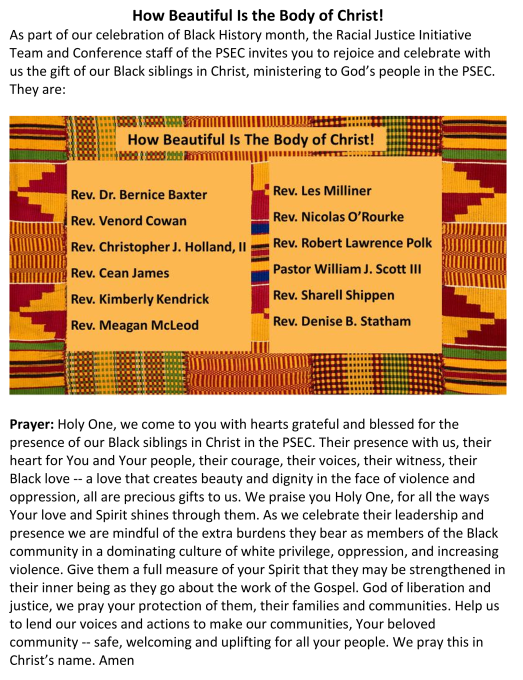
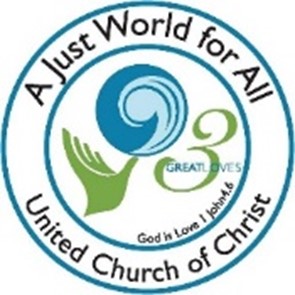 Racial Justice Symposium featuring
Racial Justice Symposium featuring
Rev. Dr. Drew Hart and Rev. Dr. John Dorhauer.
The Racial Justice Initiative Team of the PSEC of the UCC would like to share with you these links to both days of the Racial Justice Symposium held in October, 2021. We had the blessing of two great keynote speakers, the Rev. Dr. Drew Hart and the Rev. Dr. John Dorhauer. The wisdom they shared with us was so invaluable we wanted to share it with the whole conference and beyond.
| Day 1 – Click here | Rev. Dr. Drew Hart
Theology Professor, Author, Church Anti-Racism Leader, Social Change Practitioner |
| Day 2 – Click here | Rev. Dr. John Dorhauer
General Minister and President of the United Church of Christ, Author, Speaker |
“When love is the lens through which we see the world, justice is possible.”- Rev. Traci Blackmon
Click here to download this page to share with your church leaders.
Let justice roll down like a river and righteousness like a mighty stream.
~ Amos 5:24
Few people know that a very public lynching took place within the boundaries of the Pennsylvania Southeast Conference (PSEC) of the United Church of Christ in the early 20th century. Zachariah Walker, an iron worker who left Virginia in search of work and landed a position at the Worth Brothers Steel Company in Chester County was lynched on August 13th, 1911 in Coatesville, Pennsylvania. The Zachariah Walker Racial Justice
Initiative was born out of a desire to remember this atrocity and raise awareness about the ways people of faith can follow the prophetic call to stand up for racial justice.
In this time of challenge and reckoning, the light of Christ is shining through the sins of the generations, revealing how white privilege has colluded with, chosen to ignore, or refused to
see the sin of systemic racism in our midst. As Christians, we are called to open our eyes, and open wide our hearts to Black communities and all people of color who continue to be oppressed by our nation’s original sin – racism.
The veneration and idolatry of whiteness and white power creates degradation, enslavement, oppression, and racial violence that grievously injures Black and Brown people and
diminishes the humanity of white people who commit both the interpersonal and structural violence that sustain racism.
The Holy Spirit is moving through this land in the voices and hearts of those challenging the status quo of hundreds of years of racial and economic injustice and who are calling for real, concrete change. The PSEC seeks to answer this call to work for racial justice and create a culture of anti-racism within our churches and our communities by (1) facing and embracing our collective past, (2) opening our eyes, minds and hearts to the
present racial suffering and injustice, and (3) repenting and turning our hearts once again to our loving God who creates all of humanity in the divine image. This intergenerational sin can end with us as we work toward creating a culture of anti-racism and repair.
To this end, PSEC’s Zachariah Walker Racial Justice Initiative will offer ways that churches can stand in support of our Black members, neighbors, and friends. We will educate ourselves about the terrorism of white power and the violence of systemic racism and turn our hearts to action and prayer. The Zachariah Walker Racial Justice Initiative will be sharing with pastors and churches historical information, educational resources, and worship suggestions that follow the liturgical calendar, beginning in Advent 2020.
A few highlights of the themes for the liturgical year include:
- Advent – growing our awareness and shining the light of Christ on the historic atrocity of lynching and the violence of systemic racism suffered by Black individuals and communities
- Lent – exploring the intergenerational sins of racism; expressing grief and communal repentance in response to these sins
- Pentecost – offering a variety of actions congregations and individuals can engage in toward repairing wrongs and creating a culture of anti-racism
The project will culminate in an interfaith service of repentance and a sacred remembering of Zachariah Walker and the many people of color murdered by acts of racial violence in the United States.
Jesus told his followers to “…love the Lord your God with all your heart, with all your being, with all your strength, and with all your mind, and love your neighbor as yourself” (Luke 10:27). Loving our neighbor takes courage, commitment, and action. We hope that you will join the PSEC in remembering Zachariah Walker and working for racial justice as we remember the words of The Rev. Dr. Martin Luther King, Jr. in his message to the wider church: “In the end, we will remember not the words of our enemies, but the silence of our friends.”
The time is now to raise our voices for good, and together, commit and hold ourselves accountable to create a culture of anti-racism, and do the hard work of racial justice. May we, too, dream dreams of racial equity, and together, through our work in Christ, let us make these dreams a reality.
If you have questions or would like to get involved, please contact PSEC’s Zachariah Walker Racial Justice Initiative Steering Committee:
Rev. Anne Cormier
Co-Chair | annecormier@comcast.net
Rev. Cean James
Associate Conference Minister for Congregational Development | james@psec.org
Rev. Ann-Therese Ortíz
Co-Chair | ortizat@hotmail.com
Holy Week Soul Searching: Owning Our Collective Story
Brene Brown, in a 2017 video, lifts up the importance of owning our story, our truth. She states that “we spend a lot of time running away from our stories. And our collective story in the United States is a largely a story of white supremacy. That is the story. That is our story.” She goes on to say that “if we truly own our story we get to write the ending…The stories that we don’t own collectively, own us.” As we enter into Holy Week and examine the wounds of Jesus, his suffering and sacrifice, may we also be willing to look at the wounds and long suffering of Black America inflicted largely by white America and racist policies. May we commit ourselves to the process of owning our collective story so we can write the ending – an ending of healing, resurrection and new life!
“For the Inward Journey,” part of the collection of Howard Thurman’s writings.
I CONFESS
The concern which I lay bare before God today is
my concern for the life of the world in these troubled times.
I confess my own inner confusion
as I look out upon the world..
There is food for all – many are hungry.
There are clothes enough for all – many are in rags.
There is room enough for all – many are crowded.
There are none who want war – preparations for conflict abound.
I confess my own share in the ills of the times.
I have shirked my own responsibilities as a citizen.
I have not been wise in casting my ballot.
I have left to others a real interest
in making a public opinion worthy of democracy.
I have been concerned about my own little job,
my own little security,
my own shelter,
my own bread.
I have not really cared about jobs for others,
security for others,
shelter for others,
bread for others.
I have not worked for peace;
I want peace, but I have voted and worked for war.
I have silenced my own voice
that it may not be heard on the side of any cause, however right,
if it meant running risks or damaging my own little reputation.
Let Thy light burn in me that I may, from this moment on,
take effective steps within my own powers,
to live up to the light and
courageously to pay for the kind of world I so deeply desire.
PSEC Anti-Racism Statement
The Pennsylvania Southeast Conference of the United Church of Christ commits itself to the proclamation of the Gospel and the furthering of the mission of Jesus Christ. As disciples of Jesus, we are all called to follow the mandate to love one another completely, regardless of race, creed, gender, culture or difference. This is our mission: to speak the truth with love to powers and principalities, confronting bigotry and bias wherever we go.
We acknowledge the role that white Christians have played in both denying and, at the same time supporting, racist structures and attitudes, and we humbly beg forgiveness for our conforming to the evil of racism. We understand that bias can be an unconscious and unintentional failure, as well as a chosen worldview. We are reminded by the Scriptures that diversity and inclusion are necessary components of a mature, radically welcoming faith. We accept that each one of us has our own story to tell, our own history to own, and our own confession around racism for which we must atone.
Over the centuries, we have seen the pain and suffering brought about by systemic racism, and we commit ourselves to being proactively anti-racist in our work, our worship, and our communities. While we mourn the tragic losses created by a system rooted in white supremacy and nurtured by a system of white privilege, we commit ourselves to doing the work of Jesus to overcome hatred and oppression in our faith communities. We commit ourselves to opposing racism wherever it appears, whether it be institutional, economic, faith-based, or social.
Finally, we promise to be allies to all who are oppressed by these systems, committing ourselves to listen to the words of those who have been harmed by racism. We will stand in support of all who face oppressive situations, working together to dismantle the structures of this sin. We do this as servants of the risen Christ, who was Himself a poor person of color, oppressed by an invading nationalistic power, who was murdered for standing with others just like Him.
Add Your Name to the PSEC Anti-Racism Statement:
The Zachariah Walker Racial Justice task force of the PSEC of the United Church of Christ is inviting individuals and entire congregations to join our anti-racism initiatives and sign this anti-racism statement. Please click here to sign ipetitions.com/petition/psecucc-antiracism-statement
It is our hope that as we circulate this statement during Advent and Christmas-tide it promotes both reflection and discussion. Together, with courage in our hearts, we pray that Christ gives us the ability to understand this as a white problem that mars the soul of Christianity and our nation.
Educational Materials
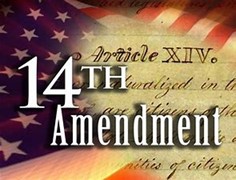 Racial Justice Team High Recommendation for Amend: The Fight for America: The 14th Amendment became part of the U.S. Constitution in 1868. Yet it took well over 100 years, not until 2003, for Ohio, the final state to ratify it. Will Smith hosts this look at the evolving, often lethal, fight for equal rights in America through the lens of the US Constitution’s 14th Amendment. This six episode series is informative, heartbreaking and hopeful, in addressing America’s ongoing struggle to realize the promises and ideals of the 14th Amendment. Amend: The Fight for America is now airing on Netflix and is available on YouTube. With each episode running approximately one hour, it would make for an excellent mid-week viewing and discussion opportunity for congregations.
Racial Justice Team High Recommendation for Amend: The Fight for America: The 14th Amendment became part of the U.S. Constitution in 1868. Yet it took well over 100 years, not until 2003, for Ohio, the final state to ratify it. Will Smith hosts this look at the evolving, often lethal, fight for equal rights in America through the lens of the US Constitution’s 14th Amendment. This six episode series is informative, heartbreaking and hopeful, in addressing America’s ongoing struggle to realize the promises and ideals of the 14th Amendment. Amend: The Fight for America is now airing on Netflix and is available on YouTube. With each episode running approximately one hour, it would make for an excellent mid-week viewing and discussion opportunity for congregations.- Curriculum Recommendation (ages 8-14): With September quickly approaching, the Racial Justice Team would like to inspire you to consider this richly impactful Sunday School curriculum –Holy Troublemakers & Unconventional Saints by Daneen Akers. Click here for more information.
- JUNETEENTH WORSHIP RESOURCES — click here to download as .docx; click here for a PDF
-
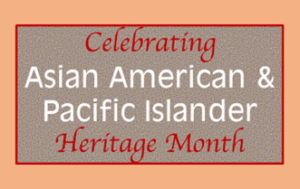 During May, the Racial Justice Initiative of PSEC invites congregations to celebrate and recognize the unique gifts of Asian American & Pacific Islander (AAPI) people and cultures, and to hold them in prayer.Erina Kim-Eubanks is Co-Pastor and Director of Advocacy at Bethel Communities. Pastor Kim-Eubanks is Korean American and states: “In the last decade, as I’ve grown in maturity and explored my sense of personal voice and identity, I’ve come to realize that to live into my Korean American identity is an act of resistance in this country, which was founded on white supremacy. And part of this resistance is to assert our dignity by making intentional space to remember our history, celebrate our cultures, and honor our ancestors and homelands”.We invite you to explore and celebrate the complex diversity of histories, cultures, languages, peoples and traditions that fall under the AAPI umbrella. To get you started, here is a link to some wonderful worship resources.
During May, the Racial Justice Initiative of PSEC invites congregations to celebrate and recognize the unique gifts of Asian American & Pacific Islander (AAPI) people and cultures, and to hold them in prayer.Erina Kim-Eubanks is Co-Pastor and Director of Advocacy at Bethel Communities. Pastor Kim-Eubanks is Korean American and states: “In the last decade, as I’ve grown in maturity and explored my sense of personal voice and identity, I’ve come to realize that to live into my Korean American identity is an act of resistance in this country, which was founded on white supremacy. And part of this resistance is to assert our dignity by making intentional space to remember our history, celebrate our cultures, and honor our ancestors and homelands”.We invite you to explore and celebrate the complex diversity of histories, cultures, languages, peoples and traditions that fall under the AAPI umbrella. To get you started, here is a link to some wonderful worship resources. -
Curriculum, White Privilege: Let’s Talk – A Resource for Transformational Dialogue, designed to invite UCC members and others to engage in safe, meaningful, substantive, and bold conversations on race.
- How to Be an Anti-Racist Congregation: James Baldwin said, “Not everything that is faced can be changed, but nothing can be changed until it is faced.” The Zachariah Walker Racial Justice Initiative of the PSEC invites you and your congregation to be intentional about the ongoing work of racial equity and justice. To this end, we encourage you to view and share this 90-minute seminar on “How to Build an Anti-Racism Congregation” presented by Earl James. https://www.nbts.edu/events/things-can-make-congregation-anti-racist/ We ask you to please post this on your webpage and other social media platforms. The more people we have engaged in this holy conversation and sacred work, the sooner we can realize God’s deep shalom.
- Reparations: A Complex Matter: Listen in on The Rev. Tim Tutt, Westmoreland UCC, Maryland, moderator of this webinar, and his guest panelists as they explore what reparations might look like for their church communities as a part of their commitment to be antiracist congregations. The panelists are: The Rev. Grey Maggiano, Rector of Memorial Episcopal Church Baltimore, Maryland tells the story of his congregation’s journey as an antiracist congregation and how they came to understanding reparations after reviewing its congregation history through the lens of race.Sushama Austin- Connor, Director of Black Theology and Leadership Center at Princeton Seminary, which has made a financial pledge to reparations
The Rev. Shari Prestemon, Conference Minister of the Minnesota Conference of the UCC which has passed a resolution to be in a process of reparations.
The Rev. Marvin Silver, Associate Conference Minister for the Central Atlantic Conference of the UCC which is working with congregations exploring reparations. Bishop Scarf of the Episcopal Diocese of Iowa which Diocese is beginning the exploration of reparations.
For congregations-If you can only listen to some of it, don’t miss the Rev. Grey Maggiano talking about the journey their congregation has taken and where they are now. (7min.25 sec. mark & again at 42 min. mark)
Liturgical Offerings
- Holy Week Soul Searching: Open PDF
- Advent Candle Lighting Liturgy: Download DOC; Open PDF
- 60th Anniversary of the March on Washington litany: Download DOC; Open PDF
Articles
- Native American Heritage Month –How we honor Indigenous people matters! In 1990 that President George H W Bush signed a joint resolution designating the entire month of November as the first, then named National American Indian Heritage Month, expanding the original Ford admiration’s Native American Week (1976).
Native American Heritage Month is set aside to celebrate Indigenous peoples past and present and to rededicate ourselves to honoring Tribal sovereignty, promote Tribal self-determination, and uphold the United States’ solemn trust and treaty responsibilities to those nations.
It’s no secret that the US has failed in this arena over centuries. Click here for the full article. - Open your mind to Indigenous Peoples’ Day: While many around us continue to celebrate Christopher Columbus on the second Monday in October, the movement to recognize that day as Indigenous Peoples’ Day has been growing since 1977. For indigenous Americans, Columbus Day has always been hurtful in its glorification of a character who participated in the violent colonization of communities who had prior existed in successful, self-sufficient communities.In an effort to broaden our understanding of indigenous populations, we thought it would cool to highlight recent native-led entertainment options that you may have missed. Native American representation in both storyline and talent have been severely underrepresented in media, and virtually nonexistent in creative roles behind the camera. This is changing and this list proves it. One or more will surely scratch your entertainment itch! Click here for the full article.
- Voting Article: We are rapidly approaching the 2022 election. In the past few years there were already challenges to free and fair elections: the influence of wealthy corporations, gerrymandering (rigging the district maps), and losing key provisions of the Voting Rights Act (we currently have fewer voting protections than we did in 1965). As such, it may be tempting to withdraw and disengage completely from the political process. Instead, I urge you to vote on Tuesday, November 8th. As Christians it matters that we vote, and that we continue to protect the right of others to vote too. In fact, the Untied Church of Christ has a campaign called “Our Faith, Our Vote, Our Voice,” which emphasizes how essential and unique faith voices are in the electoral process. When divisive and mean-spirited rhetoric dominates the public dialogue, people of faith can set an example of compassion, thoughtfulness, and civility across differences. Additionally, we are called to live out the commandment to love our neighbor as ourselves. Voting is a potent way to give voice to the change we want to see in the world. By voting, we help lift up a vision for the common good in a world that cries out for healing. Voting is a very real way that we can help ensure a just and compassionate world for all. As a citizen and as a Christian, voting is a sacred duty and responsibility. Click here to read the full article.
- Juneteenth history and meeting: Click here.
- Malcolm X: Activist and Leader: Malcolm X was a primary figure in the Civil Rights Movement, even though history has painted him as a dangerous subversive. His leadership in the Nation of Islam, as well his growth as a Muslim, gave him a voice of prominence in the American landscape. It is unfortunate that he was demonized for his early years and not recognized for his positive impact on the Civil Rights Movement. Read more.
- Sunday, May 1st, is Global Love Day — a symbolic day of unconditional love and call upon all people and all nations to come together in the wisdom of peace and love. What amazing possibilities would be present if every person and every nation observed this one day of peace and love on May 1st. How would it change our hearts? How would it change our world? Read more.
- Thanksgiving: A shift of consciousness: Author, Nikole Hannah-Jones, writes “Four Hundred years ago, in 1620, a cargo ship lowered its anchor on the eastern shore of North America. It had spent sixty-six grueling days on the perilous Atlantic Ocean, and its 102 passengers fell into praise as they spotted land for the first time in more than two months. These Puritans had fled England in search of religious freedom. We know all their names, names such as James Chilton, Frances Cook, and Mary Brewster”…. “They arrived on the Mayflower, a vessel that has been called ‘one of the most important ships in American history.’” …. “ But a year before the Mayflower, in 1619, another ship dropped anchor on the eastern shore of North America. Its name was the White Lion, and it, too, would become one of the most important ships in American history.” Read more.
- Critical Race Theory has garnered much attention as of late, and is a source of public and political debate. A July 12, 2021, Reading Eagle article, written by David Mekeel, does a good job in clarifying what critical race theory is and is not, its history, and why it is important in the work for racial justice. To read the article click here Local scholars explain CRT.
- More on Critical Race Theory from a teacher’s perspective: Teacher, Jack Conrad, posted the following conversation on his Facebook page and does a beautiful job addressing Critical Race Theory (CRT) in a polarized society. Click here for the posting.
- In the wake of the recent flood of concern surrounding policing and race in our country, many people are asking “How can I be an ally?” An article in Sojourners, written by Courtney Ariel, entitled “For Our White Friends Desiring to Be Allies”, Ariel writes “Being an ally is different than simply wanting not to be racist (thank you for that, by the way). Being an ally requires you to educate yourself about systemic racism in this country.” To learn how to become a better ally, click here for the full article.
- An Advent Examination: When Bigotry Paraded Through Our Churches and the Streets
- An Advent Examination: When Bigotry Paraded Through Our Churches and the Streets (printable version)
- Watch this 45-minute conversation with the Lead Caretaker of George Floyd Global Memorial. Her insight on this justice work is prophetic and profound. And, please share widely in your networks! We have a responsibility to hear the voices that we are called to amplify.
- You may have heard of the word “reparations” in relation to racial justice. This webinar is a wonderful place to start to begin to explore the complex issue of reparations. (Click here to view)
- “Questions After the Atlanta Mass Murders” from The Racial Justice Initiative Team of the Pennsylvania Southeast Conference.
Last week we again heard the horror of three deadly shootings, this time at Atlanta-area spas where eight people lost their lives. In the aftermath, many questions swirled around the situation, including the motive of the shooter and the treatment of the case by the Atlanta police.
The shooter, Robert Aaron Long, will face many charges as a result of his actions. However, the one most surprising to me was the verdict of his home church congregation that he was no longer welcome, he was no longer a member, he was expelled, he was too vile to be one of them.
This week’s actions provoked many questions for us, as congregations and as individuals. Included in a short list are: (Click here for full article) - NBC 10 News recently put together a collection of news stories highlighting regional racial disparity in environmental issues. To view the clips, please click this link. Big thank you to Karl Jones for sharing this information with us
Anti-Racism Community Action
Events
Racial Justice Team hosting discussion on film
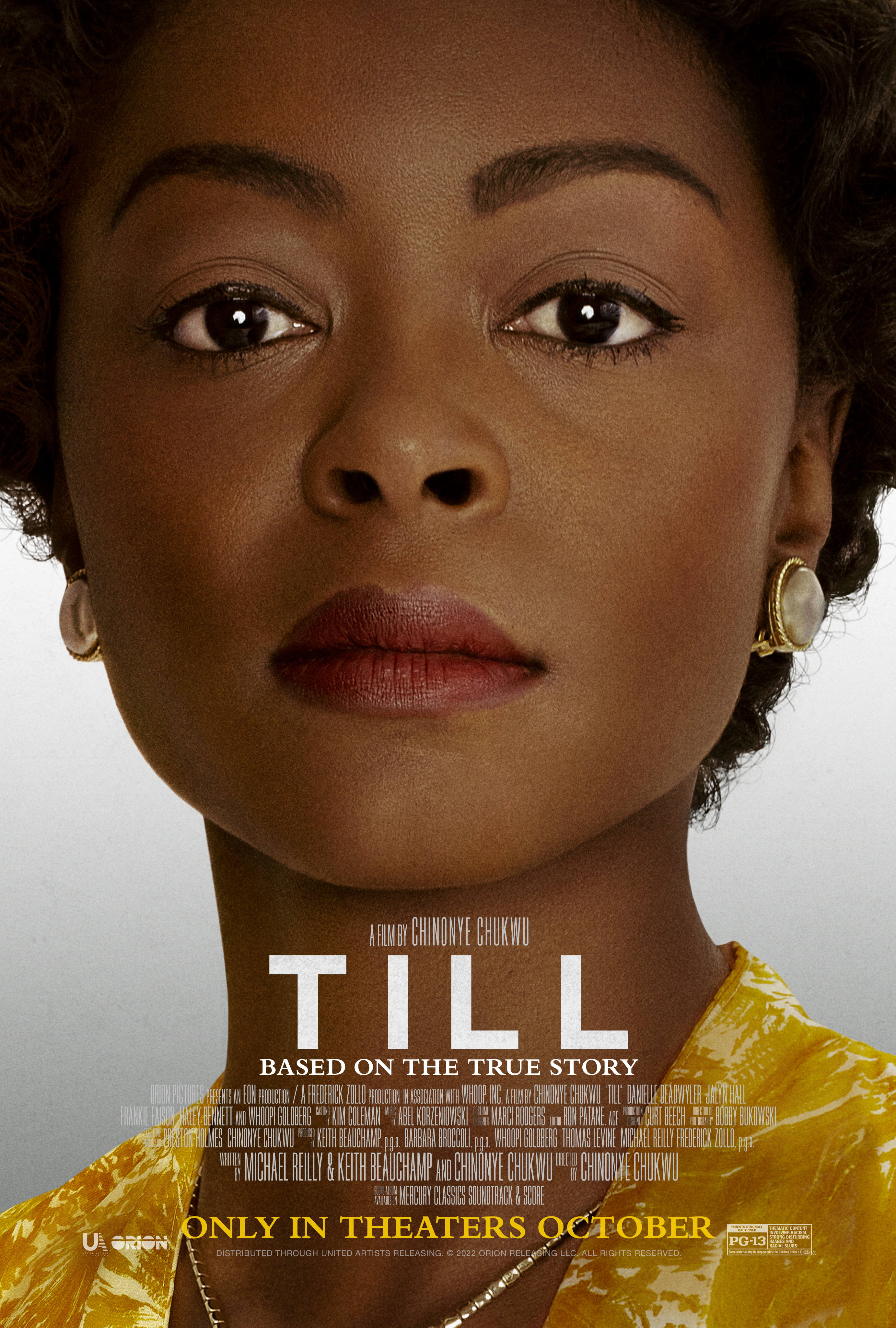 Dec. 1, 7p.m. The Racial Justice Team will lead a conference-wide discussion of the movie TILL, exploring the powerful truth-telling, justice-seeking spirit of Mamie Till, and what we can do as people of faith to thwart, change and dismantle the culture of white domination (white supremacy) and its’ centuries long systemic oppression of, and violence against, Black people and Black communities. We encourage congregations to coordinate a “Movie Night” viewing of TILL at your local theater and then join us for a time of thoughtful, faithful discussion and introspection, and an opportunity to explore what social justice campaigns or truth-telling topics your faith community is willing to actively engage in. To register for the TILL discussion click here. Registration is free.
Dec. 1, 7p.m. The Racial Justice Team will lead a conference-wide discussion of the movie TILL, exploring the powerful truth-telling, justice-seeking spirit of Mamie Till, and what we can do as people of faith to thwart, change and dismantle the culture of white domination (white supremacy) and its’ centuries long systemic oppression of, and violence against, Black people and Black communities. We encourage congregations to coordinate a “Movie Night” viewing of TILL at your local theater and then join us for a time of thoughtful, faithful discussion and introspection, and an opportunity to explore what social justice campaigns or truth-telling topics your faith community is willing to actively engage in. To register for the TILL discussion click here. Registration is free.

